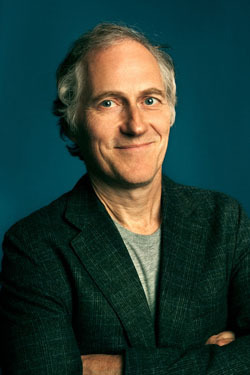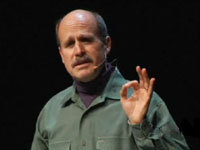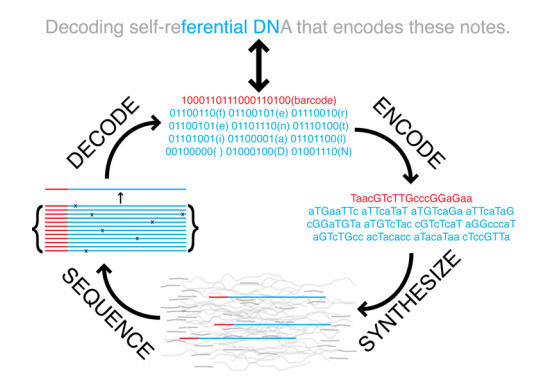Stewart Brand's Blog, page 84
September 6, 2012
Elaine Pagels Seminar Media
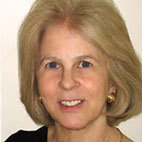 This lecture was presented as part of The Long Now Foundation’s monthly Seminars About Long-term Thinking.
This lecture was presented as part of The Long Now Foundation’s monthly Seminars About Long-term Thinking.
The Truth About the Book of Revelations
Monday August 20, 02012 – San Francisco
Video is up on the Pagels Seminar page for Members.
*********************
Audio is up on the Pagels Seminar page, or you can subscribe to our podcast.
*********************
War in heaven – a summary by Stewart Brand
“The Book of Revelation is war literature,” Pagels explained. John of Patmos was a war refugee, writing sixty years after the death of Jesus and twenty years after 60,000 Roman troops crushed the Jewish rebellion in Judea and destroyed Jerusalem.
In the nightmarish visions of John’s prophecy, Rome is Babylon, the embodiment of monstrous power and decadence. That power was expressed by Rome as religious. John would have seen in nearby Ephesus massive propaganda sculptures depicting the contemporary emperors as gods slaughtering female slaves identified as Rome’s subject nations. And so in the prophecy the ascending violence reaches a crescendo of war in heaven. Finally, summarized Pagels, “Jesus judges the whole world; and all who have worshipped other gods, committed murder, magic, or illicit sexual acts are thrown down to be tormented forever in a lake of fire, while God’s faithful are invited to enter a new city of Jerusalem that descends from heaven, where Christ and his people reign in triumph for 1000 years.”
Just one among the dozens of revelations of the time (Ezra’s, Zostrianos’, Peter’s, a different John’s), the vision of John of Patmos became popular among the oppressed of Rome. Three centuries later, in 367CE, Bishop Athanasius of Alexandria confirmed it as the concluding book in the Christian canon that became the New Testament.
As a tale of conflict where one side is wholly righteous and the other wholly evil, the Book of Revelation keeps being evoked century after century. Martin Luther declared the Pope to be the Whore of Babylon. Both sides of the American Civil War declared the opposing cause to be Bestial, though the North had the better music—”He hath loosed the fateful lightning of His terrible swift sword.” African-American slaves echoed John’s lament: “How long before you judge and avenge our blood on the inhabitants of the earth?”
But like many Christians through the years, Pagels wishes that John’s divisive vision had not become part of the Biblical canon. Among the better choices from that time, she quoted from the so-called “Secret Revelation of John”: “Jesus says to John, ‘The souls of everyone will live in the pure light, because if you did not have God’s spirit, you could not even stand up.’
“The other revelations are universal, instead of being about the saved versus the damned.”
Subscribe to our Seminar email list for updates and summaries.

September 5, 2012
Epic Tea Time
Alan Rickman in Portraits in Dramatic Time by David Michalek. Thanks to Laura for sending this in. Most of our Long Shorts have been time lapses that speed time up, this is a good one on slowing it down…
The project featured an array of glacially paced performances of theater artists and actors all genres and nationalities. With artists featured both singly and in groups, the piece offered a unique and secret glimpse into some of the world’s greatest performing artists. More at http://www.davidmichalek.net/
Scored by:
Music from Inception – Mind Heist
Created by:
David Michalek

August 29, 2012
Conversation with Laura Cunningham at The Brower Center
The Long Now Foundation will be co-presenting a conversation with artist and naturalist Laura Cunningham on Wednesday, December 5th as part of her fall 02012 exhibit at the David Brower Center’s Hazel Wolf Gallery. Cunningham’s background in paleontology, wildlife biology and natural science illustration coalesce in her beautiful book “A State of Change: Forgotten Landscapes of California,” which depicts scenes of California ecology as they would have appeared centuries ago – what she calls Old California. She ventures even deeper into the past in some cases, such as in her painting “40,000 Years Ago on the Franciscan Valley,” which portrays Pleistocene megafauna grazing the valley floor where the San Francisco Bay now sits.
In October 02011, Laura Cunningham presented the talk “Ten Millennia of California Ecology” as one of The Long Now Foundation’s Seminars About Long-term Thinking. Stewart Brand’s summary of her presentation shares some of the insights provided by her work:
Only 300 years ago the whole Bay Area was grasslands, routinely burned by the local Indians. There were oaks in the valleys, redwoods in the Berkeley Hills, and extensive oak savannahs inland. The hills were greener more of the year than now, with fire-freshened grass attracting elk, and native perennial grasses drawing moisture with their deep roots.
To see this imagery beautifully illustrated, visit her exhibit or one of the related events this fall at the Brower Center in Berkeley:
Laura Cunningham: Before California
The David Brower Center
Hazel Wolf Gallery (Fourth Annual Art/Act Exhibition)
Exhibit dates: September 13 02012 – January 30, 02013
Events
Opening Reception: Thursday, September 13. 5:30-8:00 pm
Artist talk from 6-7
Wine reception 7-8
Field Sketch Class: Saturday, September 15, 1pm – 4pm
Great Animal Orchestra: November 8, 6:30-9:00pm
A Landscape Flux: Wednesday, December 5, 6:30-9:00 pm

August 27, 2012
Tim O’Reilly Seminar Primer
Wednesday September 5, 02012 at the Cowell Theater, San Francisco
Tim O’Reilly is a prolific maker of sense. For countless hackers and programmers the world over, his publishing company’s books have helped make sense of programming languages and web technologies. And more broadly, many of the applications and services built by those hackers have, in the last decade, brought about an unprecedented expansion of our very senses. A web user of today can possess awareness of people and events at a distance, to a depth, and with a quickness that was scarcely imaginable when O’Reilly Media was founded in 1978.
Our increasing ambient awareness of the inner and outer states of people all over the globe is the result of an important shift in the way web content is created. Viewing the web as a platform on which users can participate rather than simply consume was called Web 2.0, and O’Reilly was quick to support the skills, ideas and techniques that would enable web developers to embrace this perspective. Steven Levy hinted at why in 02005:
As it turns out, the levers and pulleys of this new Net neatly reflect the operating principles of the man who helped define it: a philosophy of participation and sharing and a sense that collective action will inevitably accrue to the greater good. The crucial technologies that make this happen – the digital infrastructure that makes the online world a perpetual swap meet of goods and ideas – are the culmination of all the stuff he’s been tracking, supporting, and popularizing for the past 20 years.
O’Reilly’s focus on the web as an enabling mechanism for social awareness and empowerment (and perhaps ultimately, a “Global Mind”) looks far into the future, but is also grounded in his interest in writings and thinking done thousands of years in the past. As an undergraduate, he studied Classics and retains an affinity for the lessons he learned from Socrates, Plutarch and others. In an interview about these lessons, O’Reilly credits them with helping him to spot the trends that have led to his success in business. But more than just spotting trends, he has described and refined them, molding glimmers of ideas into causes and campaigns taken up by large swaths of the digital world. This, too, he credits to his classical education:
In telling the same story over and over again in different ways, I’m following in the footsteps of the Greek orator (alas, I forget his name) who said “The difference between a man and a sheep is that a sheep just bleats, but a man keeps saying the same thing in different ways until he gets what he wants.”) Look at a series of essays like Hardware, Software, and Infoware, The Open Source Paradigm Shift, and What is Web 2.0? and you’ll see me pursuing the same ideas, refining, clarifying, and advocating till I get what I want.
O’Reilly has taken to calling the trend he’s been mulling over most recently – this interweaving collective oneness of our brains and programs – the Global Mind.
Like open source software and “Web 2.0”, the idea has been around since before Tim O’Reilly started discussing and promoting it. But as before, perhaps in his hands – after a few revisions, a few conversations, or a few lectures – the idea of the Global Mind will take the shape of something that can be evaluated, acted upon, and maybe even rallied around.
Tim O’Reilly makes sense of the emerging Global Mind on September 5th at the Cowell Theater. You can reserve tickets, get directions and sign up for the podcast on the Seminar page.
Subscribe to the Seminars About Long-term Thinking podcast for more thought-provoking programs.

August 24, 2012
Paul Saffo on The Great Turbulence
Forecaster and Long Now board member Paul Saffo will be speaking at San Francisco’s Commonwealth Club on Thursday, September 6th about the next few decades of global economic trends.
The talk, entitled “The Great Turbulence: Economics and the New Global Order,” begins at 6pm and will be moderated by Matt Richtel, author of Our Brain on Computers. Check here for directions and ticketing information.
The 2008 crash was more than a downturn: It marked the end of the “Great Moderation,” a two-decade period of mild business cycles and growth. Now many fear we are headed toward a prolonged recession (or worse), while others predict a new boom just around the corner. Who’s right? Saffo, with over two decades of experience exploring the dynamics of large-scale, long-term change, thinks that both groups miss the point. Rather, he foresees that we have entered a new era defined not by boom or bust, but by a new kind of volatility.

August 23, 2012
Elaine Pagels Seminar Media
 This lecture was presented as part of The Long Now Foundation’s monthly Seminars About Long-term Thinking.
This lecture was presented as part of The Long Now Foundation’s monthly Seminars About Long-term Thinking.
The Truth About the Book of Revelations
Monday August 20, 02012 – San Francisco
Audio is up on the Pagels Seminar page, or you can subscribe to our podcast.
*********************
War in heaven – a summary by Stewart Brand
“The Book of Revelation is war literature,” Pagels explained. John of Patmos was a war refugee, writing sixty years after the death of Jesus and twenty years after 60,000 Roman troops crushed the Jewish rebellion in Judea and destroyed Jerusalem.
In the nightmarish visions of John’s prophecy, Rome is Babylon, the embodiment of monstrous power and decadence. That power was expressed by Rome as religious. John would have seen in nearby Ephesus massive propaganda sculptures depicting the contemporary emperors as gods slaughtering female slaves identified as Rome’s subject nations. And so in the prophecy the ascending violence reaches a crescendo of war in heaven. Finally, summarized Pagels, “Jesus judges the whole world; and all who have worshipped other gods, committed murder, magic, or illicit sexual acts are thrown down to be tormented forever in a lake of fire, while God’s faithful are invited to enter a new city of Jerusalem that descends from heaven, where Christ and his people reign in triumph for 1000 years.”
Just one among the dozens of revelations of the time (Ezra’s, Zostrianos’, Peter’s, a different John’s), the vision of John of Patmos became popular among the oppressed of Rome. Three centuries later, in 367CE, Bishop Athanasius of Alexandria confirmed it as the concluding book in the Christian canon that became the New Testament.
As a tale of conflict where one side is wholly righteous and the other wholly evil, the Book of Revelation keeps being evoked century after century. Martin Luther declared the Pope to be the Whore of Babylon. Both sides of the American Civil War declared the opposing cause to be Bestial, though the North had the better music—”He hath loosed the fateful lightning of His terrible swift sword.” African-American slaves echoed John’s lament: “How long before you judge and avenge our blood on the inhabitants of the earth?”
But like many Christians through the years, Pagels wishes that John’s divisive vision had not become part of the Biblical canon. Among the better choices from that time, she quoted from the so-called “Secret Revelation of John”: “Jesus says to John, ‘The souls of everyone will live in the pure light, because if you did not have God’s spirit, you could not even stand up.’
“The other revelations are universal, instead of being about the saved versus the damned.”
Subscribe to our Seminar email list for updates and summaries.

August 22, 2012
Duelity
Duelity from Ryan Uhrich on Vimeo.
Duelity is a split-screen animation that tells both sides of the story of Earth’ s origins in a dizzying and provocative journey through the history and language that marks human thought.
Marcos Ceravolo and Ryan Uhrich designed and directed the short animation Duelity with the Vancouver Film School. We featured it as a Long Short – our series of short films that convey long-term thinking - at the August 02012 SALT talk with Elaine Pagels. Duelity visualizes two versions of the earth’s creation, and Pagels’ presentation delves into the Book of Revelation’s apocalyptic foretelling of its end.

August 16, 2012
Storing Digital Data in DNA
Reported in Science today, scientists George Church, Yuan Gao and Sriram Kosuri report that they have written a 5.27-megabit “book” in DNA – encoding far more digital data in DNA than has ever been achieved.
Writing messages in DNA was first demonstrated in 1988, and the largest amount of data written in DNA previously was 7,920 bits. The challenge in writing more information than this has been creating long perfect sequences. The current project uses shorter sequences, each encoding 96-bit data block, along with a 19-bit address that specifies the location of the data block within the larger data set. Then redundancy reduces errors: each base only encodes a single bit (A and C are both “0”, G and T are both “one”), and each data block has several molecular copies.
DNA has several advantages for archival data storage – information density, energy efficiency, and stability. With regard to stability DNA offers readability “despite degradation in non-ideal conditions over millennia” – by which they mean 400,000 years! (See Church and Regis, in their forthcoming book on the subject.)
If we wish to intentionally use this technology for active long-term information storage (imagine some crucial message we need to convey to the future), we should probably anticipate the possibility of a discontinuity in technological knowledge and access to tools that could read the information. This raises questions of discoverability, decodability, and readability.
Ubiquity aids discoverability – if the information is everywhere it is easier to find, even stumble upon, by accident. Still, clear signals / signposts could aid discovery (neon green cockroaches anyone?). With regard to decodability, I’ll simply mention there several layers of encoding to be unraveled here: spoken human language > written language in text form > digital / binary > DNA. And presumably readability requires tools on the order of at least what we have available today, unless you can make the expression of the information obvious in some biological way.
Wonderfully exciting new stuff to conjure with from the perspective of technologies for the Long Now Library. We are also delighted to be working with Dr. George Church to provide Rosetta / PanLex data that may be written in a new “edition” of the DNA book, so check back for updates!

August 15, 2012
Cory Doctorow Seminar Media
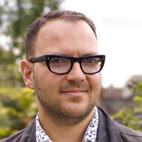 This lecture was presented as part of The Long Now Foundation’s monthly Seminars About Long-term Thinking.
This lecture was presented as part of The Long Now Foundation’s monthly Seminars About Long-term Thinking.
The Coming Century of War Against Your Computer
Tuesday July 31, 02012 – San Francisco
Video is up on the Doctorow Seminar page for Members.
*********************
Audio is up on the Doctorow Seminar page, or you can subscribe to our podcast.
*********************
Who governs digital trust?- a summary by Stewart Brand
Doctorow framed the question this way: “Computers are everywhere. They are now something we put our whole bodies into—airplanes, cars—and something we put into our bodies—pacemakers, cochlear implants. They HAVE to be trustworthy.”
Sometimes humans are not so trustworthy, and programs may override you: “I can’t let you do that, Dave.” (Reference to the self-protective insane computer Hal in Kubrick’s film “2001.” That time the human was more trustworthy than the computer.) Who decides who can override whom?
The core issues for Doctorow come down to Human Rights versus Property Rights, Lockdown versus Certainty, and Owners versus mere Users.
Apple computers such as the iPhone are locked down—it lets you run only what Apple trusts. Android phones let you run only what you trust. Doctorow has changed his mind in favor of a foundational computer device called the “Trusted Platform Module” (TPM) which provides secure crypto, remote attestation, and sealed storage. He sees it as a crucial “nub of secure certainty” in your machine—but only to the extent that it is implemented to allow owners to choose what they trust—not vendors or governments.
If it’s your machine, you rule it. It‘s a Human Right: your computer should not be overridable. And a Property Right: “you own what you buy, even if it what you do with it pisses off the vendor.” That’s clear when the Owner and the User are the same person. What about when they’re not?
There are systems where there is a credible argument for the authorities to rule—airplanes, nuclear reactors, probably self-driving cars (“as a species we are terrible drivers.”)—but at least in the case of cars, and possibly in the other two, it will not make us safer; it will make us less safe. The firmware in those machines should be inviolable by users and outside attackers. But the power of Owners over Users can be deeply troubling, such as in matters of surveillance. There are powers that want full data on what Users are up to—governments, companies, schools, parents. Behind your company computer is the IT department and the people they report to. They want to know all about your email and your web activities, and there is reason for that. But we need to contemplate the “total and terrifying power of Owners over Users.”
Recognizing that we are necessarily transitory Users of many systems, such as everything involving Cloud computing or storage, Doctorow favors keeping your own box with its own processors and storage. He strongly favors the democratization and wide distribution of expertise. As a Fellow of the Electronic Frontier Foundation (who co-sponsored the talk) he supports public defense of freedom in every sort of digital rights issue.
“The potential for abuse in the computer world is large,” Doctorow concluded. “It will keep getting larger.”
Subscribe to our Seminar email list for updates and summaries.

Steven Pinker Seminar Tickets
Seminars About Long-term Thinking
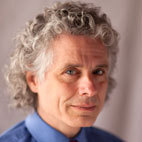
Steven Pinker on “The Decline of Violence”
TICKETS
Monday October 8, 02012 at 7:30pm Herbst Theater at Civic Center
Long Now Members can reserve 2 seats, join today! • General Tickets $10
About this Seminar:
Steven Pinker changes the world twice in his new book, THE BETTER ANGELS OF OUR NATURE: Why Violence Has Declined.
First, he presents exhaustive evidence that the tragic view of history is wrong and always has been. A close examination of the data shows that in every millennium, century, and decade, humans have been drastically reducing violence, cruelty, and injustice—right down to the present year. A trend that consistent is not luck; it has to be structural.
So, second, he boldly founds a discipline that might as well be called “psychohistory.” As a Harvard psychologist and public intellectual (author of The Language Instinct and The Blank Slate), he sought causes for the phenomenon he’s reporting—why violence has declined. Real ethical progress, he found, came from a sequence of institutions, norms, cultural practices, and mental tricks employed by whole societies to change their collective mind and behavior in a peaceful direction.
Humanity’s great project of civilizing itself is far from complete, but Pinker’s survey of how far we’ve come builds confidence that the task will be completed, and he illuminates how to get there.

Stewart Brand's Blog
- Stewart Brand's profile
- 291 followers



